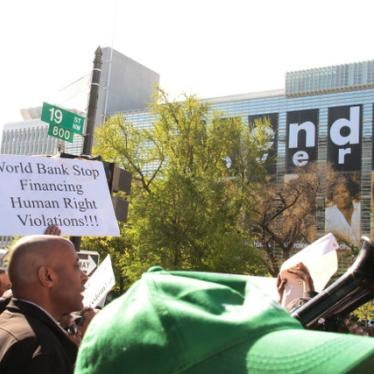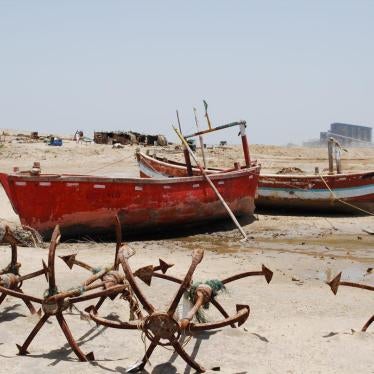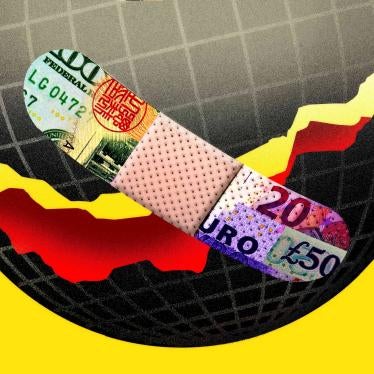Dear President Malpass:
Greetings from Human Rights Watch, an independent organization dedicated to protecting human rights. We welcome the World Bank Group’s announcement of a US$12 billion financing plan to help low- and middle-income countries buy Covid-19 vaccine doses. We write to urge the World Bank Group’s Board of Directors to take urgent steps to address barriers to equitable vaccine access before approving the financing plan.
As you know, many high-income countries have already negotiated bilateral agreements with pharmaceutical companies, universities, and other entities, reserving future vaccine doses. There is very little transparency around these deals, including information about the terms and conditions and consequences for breach of contract.
These deals will exacerbate scarce vaccine supplies and will significantly impede the impact of the World Bank’s financing plan to help low- and middle-income countries procure sufficient vaccines in a timely manner and at affordable prices.
Further, the global procurement mechanism that is currently being developed for low- and middle-income countries is the COVAX Facility. A financing plan that provides loans or grants to low- or middle-income countries, that would indirectly pay for the procurement of vaccines from the COVAX Facility, should closely examine the investment case for the COVAX Facility and its related pricing strategies to determine whether they maximize availability and affordability, and are negotiating the best possible prices from companies. Without such strong scrutiny, the World Bank’s financing plan will fail to maximize availability and affordability of any safe and efficacious Covid-19 vaccines and will not have achieved the best possible returns on investment in terms of number of doses funded.
In particular, the World Bank should consult with low- and middle-income governments, including those that have endorsed the World Health Organization’s Solidarity Call to Action on the Covid-19 Technology Access Pool.[1] Unless the World Bank uses its funding power to significantly alter the course of events addressing vaccine scarcity and pricing, the impact of its funding will be severely undermined. These key barriers are discussed in greater detail in Annex I to this letter.
For the World Bank’s funding to be impactful, we urge the Board to take the following urgent actions:
- Before approving the financing plan, it should conduct robust due diligence to assess barriers to vaccine supply and availability, including through the COVAX Facility. The World Bank should either directly develop, maintain, publish, and periodically update a map of vaccine production capacity or seek an enforceable commitment from the COVAX Facility to do so. Such a map should indicate what vaccine manufacturing capacity exists, what has been reserved already and for which countries; and identify unused or under-used manufacturing capacity that could be repurposed for vaccine manufacturing.
- Before approving the financing plan and disbursing any funds, the World Bank should urgently develop and publish an Equitable Access Policy for Covid-19 vaccines, in consultation with governments from low- and middle-income countries, as well as civil society with expertise on access to medicines and vaccines, intellectual property, and pricing. The policy should be centered on human rights principles and good public health practices. It should build on existing good practices, including those from the Equitable Access Policy of the Coalition for Epidemic Preparedness Innovations (CEPI).[2] The World Bank’s Equitable Access Policy on vaccines should be included in all its funding agreements.
Any funding disbursed by the World Bank either directly to the COVAX Facility, or indirectly to governments that can be used by them to purchase vaccines from the COVAX Facility, should involve additional robust due diligence about the COVAX Facility, especially concerning its governance, transparency policies, investment case, and pricing strategies.
As part of its due diligence, the World Bank – as one of the co-founders of Gavi and a Gavi board member – should seek the following assurances from the COVAX Facility before approving financing plans:
-
- Transparency and Disclosure policy for the COVAX Facility, which is developed in consultation with low- and middle-income governments as well as civil society representatives, that should govern all governance proceedings as well as agreements signed on behalf of the COVAX Facility.
- Transparent pricing by all companies entering into contracts to produce vaccine doses for the COVAX Facility to demonstrate that the procurement system has maximized affordability and minimized debt for countries;
- Third party audits to show that the COVAX Facility and participating companies have met the requirements of the World Bank’s equitable access policy;
- Commitment to signing the Open Covid Pledge, that is, voluntary, non-exclusive licensing for all companies producing for the COVAX Facility;
- Commitment to technology transfer and the sharing of intellectual property, including data and know-how related to successful vaccine candidates, in line with the principles of the World Health Organization’s Covid-19 Technology Access Pool (C-TAP).
- Commitment to integrating representatives from low- and middle-income governments as well as civil society representatives in the COVAX Facility governance structure, as well as in various sub-committees.
Thank you for your consideration. We look forward to your response and would be happy to discuss our research and recommendations with you or your staff. Please contact us at somayan@hrw.org should you wish to speak further.
Best Regards,
Aruna Kashyap
Senior Counsel
Business and Human Rights Division
Komala Ramachandra
Senior Researcher
Business and Human Rights Division
Annex I
Rich governments are signing bilateral deals to secure future doses of vaccines, undermining calls for global solidarity and co-operation toward equitable vaccine access and exacerbating the projected scarcity of vaccine supply. A September 2020 Oxfam study revealed that rich countries with 13 percent of the world’s population have pre-booked 51 percent of the promised doses of several leading COVID-19 vaccine candidates.[3] Oxfam analyzed available information on deals made around five of the nine vaccine candidates that were in phase 3 clinical trials in September and estimated that these five vaccine candidates could yield a total of 5.94 billion vaccine doses for the world – enough to vaccinate roughly 2.97 billion people worldwide, assuming each vaccine requires two doses. But supply deals negotiated with vaccine developers have already reserved nearly 90 percent (5.303 billion) of those doses. The majority (51 percent) are reserved for high-income countries including “the UK, US, Australia, Hong Kong & Macau, Japan, Switzerland and Israel, as well as the European Union,” even though these countries represent only 13 percent of the world’s population. Oxfam explained, “the remaining 2.575 billion doses have been bought by or promised to developing countries including India, Bangladesh, China, Brazil, Indonesia and Mexico among others.” Three hundred million doses of the AstraZeneca vaccine have been pledged to the COVAX Facility.
Key barriers that need to be addressed to ensure lower-income governments are able to procure vaccines in a timely manner and at affordable rates, are pricing, vaccine scarcity, and complex intellectual property barriers.
Pricing
The pandemic has already left countries in deep financial distress and in greater debt. The World Bank should use its leverage to ensure that any vaccine procurement efforts it funds comes with pricing terms that maximize availability and affordability for lower-income governments. There are growing concerns that the pricing strategies proposed by the COVAX Facility do not maximize affordability, which would deeply impact the return on investments for any World Bank grants or loans, and directly impact how many people governments can procure vaccines for. In addition, the World Bank should require recipient governments to make vaccines affordable to their populations. In many contexts, vaccines will only be accessible and affordable for communities if they are free at point of care.
In April, the World Bank warned that due to the Covid-19 crisis and the drop in oil prices, “For the first time since 1998, poverty rates will go up as the global economy falls into recession and there is a sharp drop in GDP per capita.” In June, the World Bank projected that the pandemic could push between 70 and 100 million people into extreme poverty – living on less than $1.90 a day – in 2020. As the Bank is aware, people living in poverty are more likely to live in crowded or poor-quality housing and lack the resources to stay at home for long periods or follow hygiene recommendations. Low-paid jobs with poor working conditions force them to choose between risking their health or losing their income. Affordability of vaccines, and free access for those who cannot pay, will be critical in ensuring equitable access.
Vaccine Supply
Vaccine manufacturing – highly specialized and limited know-how, largely located in high-income countries – is one of the key barriers to expanding production.[4] The WHO says that transfer of technology is critical for manufacturing and distributing vaccines rapidly.[5] Numerous governments have repeatedly raised alarms about vaccine access for low- and middle-income countries, specifically urging technology transfer and open sharing of intellectual property. In May, the Costa Rican government, in partnership with the WHO, launched a Covid-19 Technology Access Pool (C-TAP), and issued a solidarity call to action, which has been endorsed by 40 governments.[6]
In late June, the African Union ministers of health and heads of delegation issued a communique highlighting the challenges for vaccine access in Africa. They called on all countries “to ensure that all relevant technologies, intellectual property, data and know how are openly and immediately made available and rapidly scaled-up.”[7]
Third World Network, a nongovernmental organization, has developed an online map, “VaxMap,” that shows the “vastly unequal geographic distribution of manufacturing capacity of Covid-19 vaccines.”[8] As VaxMap shows, large parts of Africa, Asia, and Latin America do not have any significant manufacturing capacity today and likely will be dependent on imports. Only a handful of countries in those regions of the world have vaccine manufacturing capacity.
Mapping out known and existing vaccine production capacity, understanding what manufacturing capacity has been reserved already and by whom, and identifying unused or under-used manufacturing capacity that can be repurposed for vaccine manufacturing is central to making the World Bank’s funding effective and should be part of the Bank’s due diligence before fund disbursals.
The multiple layers of intellectual property are significant barriers to scaling up and rapidly manufacturing Covid-19 vaccines. Dr. Leena Contarino and Ellie Purnell, IP experts from HGF, a specialist global IP law firm, wrote, that “in many instances, the new Covid-19 vaccines will be built on proprietary platform technologies, such as viral vectors, mRNA-technology, nanoparticles and the like, which in themselves may be covered by multiple earlier patents owned by multiple different parties. Access to these platform technologies is also required if a novel vaccine incorporating the technology is to be produced and sold.”
The number of patents implicated is unknown but likely large. In the past, for instance, a 2012 WIPO, WHO, and WTO study tracking patents for vaccines related to human influenza, pneumonia, and typhoid found 11,808 “patent families” (a patent family is a set of patent filings made in various countries to protect a single invention) filed between 1921 and 2011.[9] These complex and multi-layered intellectual property protections present serious obstacles to expanding vaccine production in many low- and middle-income countries.
[1] World Health Organization (WHO), “Endorsements of the Solidarity Call to Action,” https://www.who.int/emergencies/diseases/novel-coronavirus-2019/global-research-on-novel-coronavirus-2019-ncov/covid-19-technology-access-pool/endorsements-of-the-solidarity-call-to-action (accessed October 6, 2020).
[2] CEPI’s Equitable Access Policy states, “Equitable access to epidemic vaccines in the context of an outbreak means that appropriate vaccines are first available to populations when and where they are needed to end an outbreak or curtail an epidemic, regardless of ability to pay.” Coalition for Epidemic Preparedness Innovations (CEPI), “Equitable Access Policy,” 2019, https://cepi.net/wp-content/uploads/2019/01/Equitable-Access-Policy.pdf (accessed October 2, 2020), p. 1.
[3] “Small group of rich nations have bought up more than half the future supply of leading COVID-19 vaccine contenders,” Oxfam International news release, September 17, 2020, https://www.oxfam.org/en/press-releases/small-group-rich-nations-have-bought-more-half-future-supply-leading-covid-19 (accessed October 1, 2020).
[4] WHO and International Centre for Trade and Sustainable Development, Increasing Access to Vaccines through Technology Transfer and Local Production, (France: WHO, 2011), https://www.who.int/phi/publications/Increasing_Access_to_Vaccines_Through_Technology_Transfer.pdf (accessed on July 23, 2020).
[5] Ibid.
[6] WHO, “Covid-19 Technology Access Pool: Endorsements of the Solidarity Call to Action,” https://www.who.int/emergencies/diseases/novel-coronavirus-2019/global-research-on-novel-coronavirus-2019-ncov/covid-19-technology-access-pool/endorsements-of-the-solidarity-call-to-action (accessed September 13, 2020).
[7] African Union and Africa Centers for Disease Control and Prevention (CDC), “Communique from Africa’s leadership in Covid-19 Vaccine Development and Access Virtual Conference,” June 24-25, 2020, https://africacdc.org/news-item/covid-19-vaccine-development-and-access-virtual-conference/
[8] Third World Network, “VaxMap,” updated July 22, 2020, http://vaxmap.org/ (accessed July 29, 2020).
[9] Most of them were first filed in the US. Other top patent filing destinations included UK, China, Russia, Japan, France, European Patent Office, Australia, South Korea, Germany, Denmark, Ukraine, Spain, Canada, Netherlands, Sweden, Brazil, India, and Cuba.








